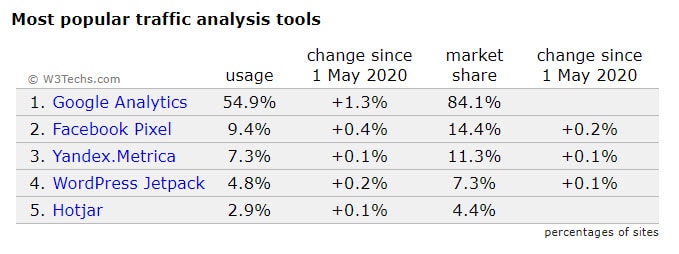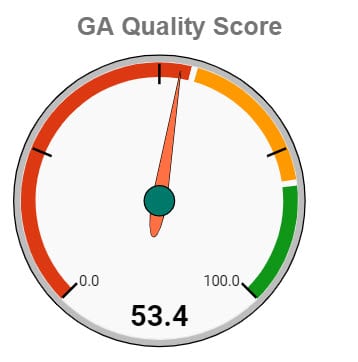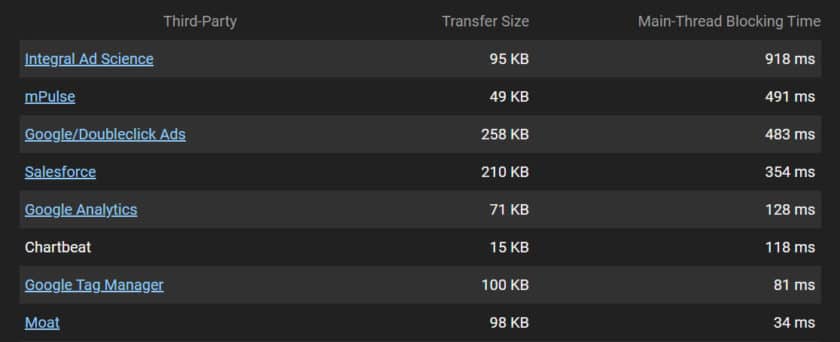The esteemed reader may have read the title of this article a little distracted. For this reason I will resume it, so that there is no doubt: “Analytics tools: 5 reasons NOT to use them”. It may sound strange coming from an analytics consultant but I’ll explain.
We are in a data driven era where much of the decision making is supported by data. To suggest that a website can operate without analytics information seems insane. Is it really? Can a website or e-shop benefit from not using analytics tools?
What are analytics tools?
First of all, I warn you that I will be dealing with web analytics tools but the idea also applies to offline.
Second, I am not just referring to Google Analytics (the most widely used analytics tool in the world) but all web analytics tools (Adobe Analytics, Yandex, Matomo, Hotjar, cxense, etc.).

So, what are analytics tools?
Analytics tools are systems that aim to measure, collect, analyze, and produce reports on the navigation and behavior of visitors to your site or application.
You will find much more complete (and complex) definitions, but for the sequence of this article the definition I have presented is sufficient.
Most organizations use more than one analytics tool. Together, these tools give the organization a complete view of the company by providing insights and understanding of the business. Thus, smarter decisions can be made regarding business operations, customer conversions, and more.
Reasons not to use analytics tools
Now you may be asking yourself things like “how can having data be bad?”, “how am I going to make decisions if I have no data?” or, at best, “how do I lead my business to success without analytics data?”
You see, I am not saying that we should not collect visitor data or that data is bad. It turns out that in some cases it may be better not to use analytics tools at all.
In some organizations the use of analytics tools can generate so much noise, due to the reasons I will explain below, that it may be advantageous not to use them.
So let’s look at 5 reasons not to use analytics tools.
Bad Data
In God we trust. All others must bring data.
W. Edwards Deming
The phrase above (often used by agencies and consultants) would be better suited this way:
In God we trust. All others must bring good data.
In most of my Google Analytics audits (stand-alone or initial analytics consulting audit) I run into configuration issues, incorrect handling and manipulation of data, etc.

What kind of insight or decision will the board of an organization make when its data is (only) 50% reliable?
If the data you get from your analytics tools is 50% correct (or 50% incorrect), your hit margin may not be very good. Why use analytics tools to make a decision that will have the same chance of being correct as if it were decided on a coin toss?
Obviously this is a transitory situation that during consulting is corrected. Still, it serves as a warning to organizations that have their analytics operations internalized or have not had the proper advising.
If your organization cannot guarantee a minimum level of data reliability, it is better to save resources on this operation.
Solving the problem of bad data
Perform periodic audits of all your analytics tools or hire a consulting firm to do so. If you have an internal team for data analysis, make sure they are properly trained to identify whether the available data is good or bad. 80% reliability is a good starting point.
Read also: Mini audit of Google Analytics
Decisions based on guesswork
Ok. You and your team have done an excellent job and your data has an adequate level of reliability. When presented to the decision makers, they are simply ignored or “lose out” to a (more beautiful) Power Point presentation with more convincing (aesthetic) power.

Run away! If your analyses are reliable but never used in the organization’s strategic decisions, rethink your actions.
I know companies that have complete analytics/BI teams that have always lost out to a colorful presentation with 3D graphics from someone in commercial.
If guesswork is the mechanism for decision making in your company, why waste resources (time and money) on tools and data analysis?
Fighting against decisions based on guesswork
Make a more colorful presentation with more 3D elements and animations than the sales department.
Nooooooooooooo!!! Just kidding, don’t get into this war. Commercial people usually have plenty of time to make more elaborate presentations.
Seriously. Create a connection with management, present the methodology, show the results so that cause and effect are clear and tangible. Focus on results and keep track of relevant information.
User Privacy
Organizations that are already compliant with GDPR (and in Brazil soon with LGPD) know how laborious it is to implement, collect, and handle data correctly.
I am in favor of collecting, processing and analyzing data, if done in the right way. If the user says he doesn’t want to be tracked, don’t track him. Don’t use hacks or whatever to collect browsing data without consent. It is immoral and unethical.
Imagine the following scenario: 25% of your website users use adblockers or browsers that can block any kind of tracking. Another 50% do not agree with your cookie policy and do not authorize tracking. You will have data from less than half of your visitors. You can still make decisions based on this data, but the sampling must be of high quality to support sound decisions.
Since I mentioned it, let me talk a little bit about data sampling. Data sampling is nothing more than sampling the data. Google Analytics is king in this regard (especially the free version). Not that other tools don’t do it, but GA is the best known and for sites with high traffic the sampling can be relevant (and annoying).

That is, if to fulfill privacy requirements you must give up a significant amount of data (quantitative and qualitative) it might make sense not to collect it in the first place.
Using analytics and maintaining user privacy
Be transparent and offer the option for your visitor to accept tracking or not. Do not capture personal or sensitive data that could in any way identify the visitor and do not share data with third parties.
If a sample of the data is enough, work smart. If you have a paywall and understanding subscriber behavior is enough for business decisions, why capture information from all users (subscribers and non-subscribers)?
Site Performance
I have audited sites that were firing multiple tags from Google Analytics, Facebook pixel, LinkedIn pixel, cxense/Piano, Yandex, Hotjar, Crazyegg, etc. No matter how optimized the implementation of these tags is there will still be an impact on the page load and we will be affecting the visitor experience.
If you are not using Facebook analytics or creating targeted audiences, why have a Facebook pixel on your site? Why use Hotjar and Crazyegg at the same time if the only functionality of the tools you are using can perhaps be obtained by Google Analytics?

There are cases where low performance analytics implementations can double page load times. If you own an e-commerce, every second matters. I would venture to say that some online stores could increase their revenue by 20-30% if they did not use analytics tools.
How would this happen? Offering a better user experience, providing privacy and security, better analyzing the sales made.
Solving the performance problem
Avoid loading analytics tools that will not contribute relevant data to your business. Use the essential settings optimally.
Try to load tags from analytics tools through a tag manager such as Google Tag Manager, Adobe Dynamic Tag Management or Tealium.
Read also: How to install Google Analytics using Google Tag Manager
Lack of understanding of the analytics tool
Many organizations invest large amounts of money in analytics tools. However, a good number of them do not have professionals capable of using these tools and providing insights for good decision making.
It is common for companies to look at metrics that are irrelevant to the business or in the wrong way.
Read also: Digital Marketing Metrics: which ones are important?
Google Analytics itself is a box of surprises for those who have not mastered it. Concepts such as dimensions and metrics, users, sessions, and bounce rate are often misunderstood.
And if we get into more advanced topics like attribution models, assisted conversions, or measurement models the business gets even more complicated.
Analytics tools should not only serve to generate reports and feed dashboards.
Analytics tools must answer business questions.
Read also: 10 SEO Tools Every Website Should Use
Understanding analytics tools
Invest not only in tools but also in staff training. Hire professionals (internal or outsourced) who can extract relevant information for the organization.
Free analytics tools, such as GA itself, can be used and generate insights for all types and sizes of organizations. Invest in the correct configuration of these tools and get the most out of them before hiring expensive tools.
In conclusion
Analytics tools can contribute to the success or failure of an organization.
Those that don’t get good data, make decisions based on opinions, don’t respect user privacy, have performance problems, or don’t understand the workings and data generated may consider dropping them.
If you are not going to use the data to improve your organization, save time and money.
Those that have some of these problems but want the data to bring insights should consider correcting these aspects.
If you are experiencing any of these issues in your organization and want to talk about it, feel free to get in touch or learn more about my analytics consulting.